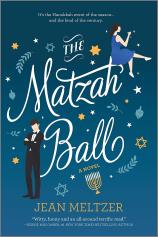The Matzah Ball
Review
The Matzah Ball
Matzah balls are soft and filling, and satisfying in warm soup. However, THE MATZAH BALL might be better compared to the rugelach that Jean Meltzer’s characters love to nosh on --- sweet and sometimes nutty, but made with love (and honesty) and a texture that melts in your mouth. This story is filled with lots of love in the best tradition of any romance novel, but it's so much more. Meltzer provides us with an inside look at a protagonist who is strong and successful while struggling with a chronic disease.
How do you find love when you're too ill to work a "normal" job? With myalgic encephalomyelitis, which is commonly referred to as chronic fatigue syndrome, Rachel Rubenstein-Goldblatt simply cannot do what others can. Chronic fatigue syndrome is, according to Meltzer (through Rachel's narrative), "the most trivializing name for a disease in the entire world. The equivalent of calling Alzheimer's 'Senior Moment Syndrome."' She goes on to share what having it entails: "crushing fatigue, migraines, brain fog or weirdo pains...25 percent of patients who found themselves bed-bound or homebound --- existing on feeding tubes, unable to leave dark rooms for years --- or the 75 percent of patients who could no longer work full-time."
"This holiday romance will go down as easily as a perfectly made matzah ball and will sweeten your day like a chocolate rugelach."
Meltzer is an expert at describing ME/CFS because she, like Rachel, has it. And Rachel, like Meltzer, is a writer. But, unlike Meltzer, Rachel is the author of Christmas romances, some of which have been made into movies. The only catch? Her father is the rabbi of a prestigious conservative temple and known around the world for his wisdom, so she has been raised to understand that their family is constantly under a microscope. Rachel is expected to be a perfect Jewish daughter. Loving Christmas is not okay. When she innocently asks her father about a Jew like Irving Berlin, who created songs like “White Christmas” that have become Christmas traditions, he shares his thoughts. So Rachel never reveals her true occupation to her parents. When they ask, she vaguely responds that she's a freelance editor and writer. While the whole world knows and loves Margot Cross, no one suspects that Rachel Rubenstein-Goldblatt is that person.
This Hanukkah is going to be different. Rachel's first love from Jewish summer camp, Jacob Greenberg, is coming to New York from Paris to orchestrate the Matzah Ball Max. Matzo Balls are thrown for single Jews in search of something to do on Christmas. For around 40 years, these celebrations have spread and grown, and the fictional Matzah Ball is based on them. Who knew? I certainly didn’t.
The other events that have made Jacob a wealthy party planner include parties on islands and at beaches, where, thanks to influencers, the ultra-rich and social media, his success has been assured. A New York winter party isn't likely to provide the same beautiful photos as a glamorous island with bikini-clad women on lounge chairs sipping mojitos. Jacob has never forgotten Rachel, even though she dumped him without a word and disappeared. He has called her parents because he wants her famous (in Jewish circles) father to light the last Hanukkah candle at the Matzah Ball. Getting to see Rachel at their home during Shabbat dinner is a plus. So he's perplexed when she begs him for a ticket to the party and won't tell him why she needs it.
Rachel is desperate. Now that her writing contract is up, her publishers are demanding that she write a Hanukkah romance or they will not renew her. While Christmas is magical, with Santa, sleigh bells and scented wreaths, Hanukkah is just dreidels, latkes and a menorah. How can she possibly write a romance about a holiday so lacking in fantasy, magic and wonder? Her only hope is to attend the Matzah Ball and use it as the basis for her story. So can she persuade Jacob, who completely humiliated her at summer camp, to give her a ticket?
The plot isn't especially creative, but in some ways, romances are all the same. We know there will be a happy ending and lots of misunderstandings from the first time the couple meet until they declare their love for each other. What makes a romance stand out is all the in-between: the setting, the personalities of the characters, the type of problems they face. And it's here where Meltzer's writing shines.
We learn about ME/CFS and admire Rachel for her fortitude and determination to live life as fully as possible. Due to her illness, she is more kind to those who have physical problems that might cause others to devalue them. How many of us treat those who are different in a dismissive manner, ignoring or not interacting with them because we don't know how or are afraid of embarrassing ourselves? Rachel's loyalty to her best friend, Mickey, and her thoughtfulness are so endearing. Even her secrecy regarding her profession is based on not wanting to upset her parents or embarrass her father with his congregation. She's a real mensch. But despite what she thinks, we come to find out that Jacob is also a real mensch. Perhaps these two mensches deserve each other.
This holiday romance will go down as easily as a perfectly made matzah ball and will sweeten your day like a chocolate rugelach. But be warned: it also will make you crave Chinese food, which is a Jewish staple during Christmastime. The characters partake liberally of Kung Pao Chicken and spring rolls over the course of the book. Really.
Reviewed by Pamela Kramer on October 8, 2021




